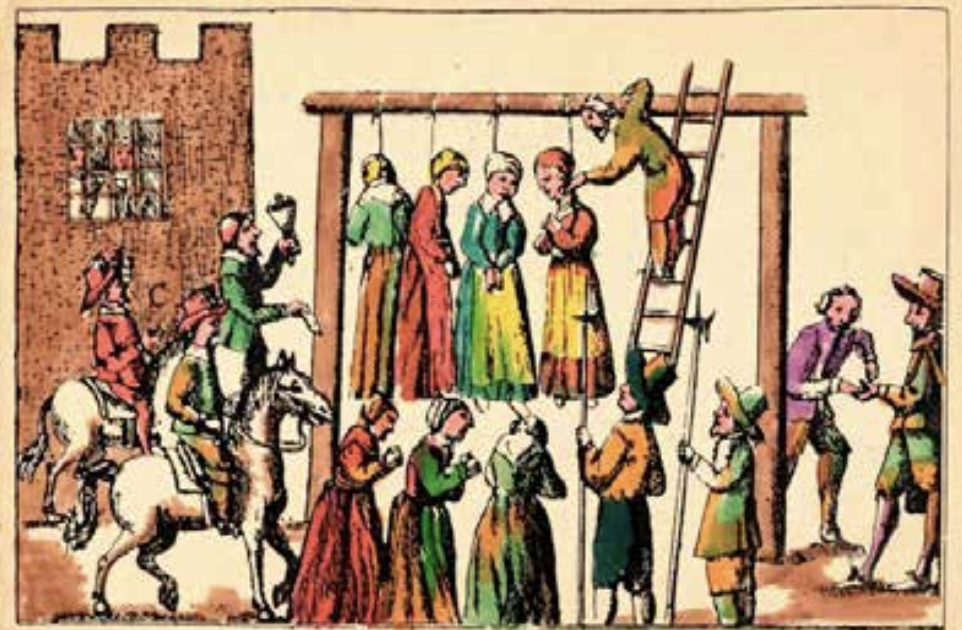Scotland is as one of the most progressive and rational places on earth, a beacon of liberalism. But there was a time when this country was the most barbaric, superstitious and blood-soaked part of Europe
Between the late 1500s and the end of the 1600s, Scotland was gripped by a collective madness that exhibited itself in butchery, cruelty and organised mass murder. The Scottish Witch Trials can be seen as a case of national psychosis. While witch trials took place across Europe, here they reached a level of savagery seen nowhere else. Across Europe, around 50,000 people were executed as witches. In the 1600s, Scotland had a population of just 800,000. Here, an estimated 4,000 people, mostly women, were tortured and executed by the Kirk and state for witchcraft.
The Fishwife of Edinburgh
The case of Agnes Finnie, an Edinburgh trader, is the archetypal Scottish witch trial. Finnie was a poor woman and a nasty piece of work. Over the years, at least half a dozen people she cursed fell ill. One lost the power of speech, one broke a leg, one was paralysed and one died. People began to refer to her as a witch. The authorities were informed. Finnie was taken to the tollbooth in 1642 and held as a witch. She was burned at the stake on Castle Hill.

Isobel Gowdie
It seems Isobel Gowdie really did believe she was a witch – though she was probably also an attention-seeker. She was arrested in 1662 and taken to the Kirk at Auldearn for interrogation. No torture was necessary as she openly told an elaborate story of witchcraft.
Gowdie confessed to dalliances with the Devil, turning horses into straw, meeting the Queen of Fairyland, stealing milk from cattle, and plotting to harm children using wax images. There’s no record of Gowdie’s execution but that’s not usual: 90 per cent of records are missing.
The Witches of Pollokshaws
Aristocrat Sir George Maxwell, a well-known witch-hunter, fell ill in 1676. A friend of his daughters, Janet Douglas, claimed Janet Mathie had made a wax image of Maxwell and stuck pins in it. The figurine was found and Mathie arrested.
Janet accused Mathie’s son, John Stewart, of the same crime. Again, the doll was found, and Stewart was arrested. His 13-year-old sister, Annabel, was also arrested. Under interrogation, she named names. Soon six people were in custody, including 80-year-old Margaret Jackson. Due to Annabel’s young age, the court only jailed her. The five others were burned at the stake.
Many now think it was Janet who planted the wax dolls in order to frame those she accused. Her motives remain unknown. Money, fame, attention? What we do know is that she eventually fell foul of the law herself for reasons that are unclear, and was whipped in Edinburgh then banished.
The Paisley Witches
Christian Shaw was the 11-year-old daughter of the Laird of Bargarran. In 1696 she fell ill. She deteriorated, apparently coughing up hair, feathers, sticks and bones. She accused a number of poor women in the neighbourhood of cursing her.
Once a highlander called at the Laird’s home seeking shelter and Christian accused him of witchcraft. In all six people were held. Soon defendants were admitting to consorting with the Devil. More names were named, more arrests made. By the time of the trial 27 people were accused. Charges included the murder of babies, drowning two men in a ferry accident, and killing a minister with fever.
Two accused died in jail before the trial could start. Seven were finally taken to court and all strangled and burned. Christian recovered and founded in the Bargarran sewing thread company.
The Last Witches

The last witch executed in Scotland was Janet Horne in 1727 in Dornoch. She was senile and her daughter had deformed feet and hands. Neighbours accused Horne of shoeing her daughter like a horse and riding on her to meet the Devil. Both mother and daughter were sentenced to death. The daughter escaped but Horne was stripped, smeared and tar, paraded through the town in a barrel and set alight.
Nine years after Horne’s death, the witchcraft laws were repealed as Scotland embraced the Age of Enlightenment.
Immerse yourself in spooky Scotland with our
October ‘Scottish Hallowe’en’ WeeBox,
on sale now until September 30th!







